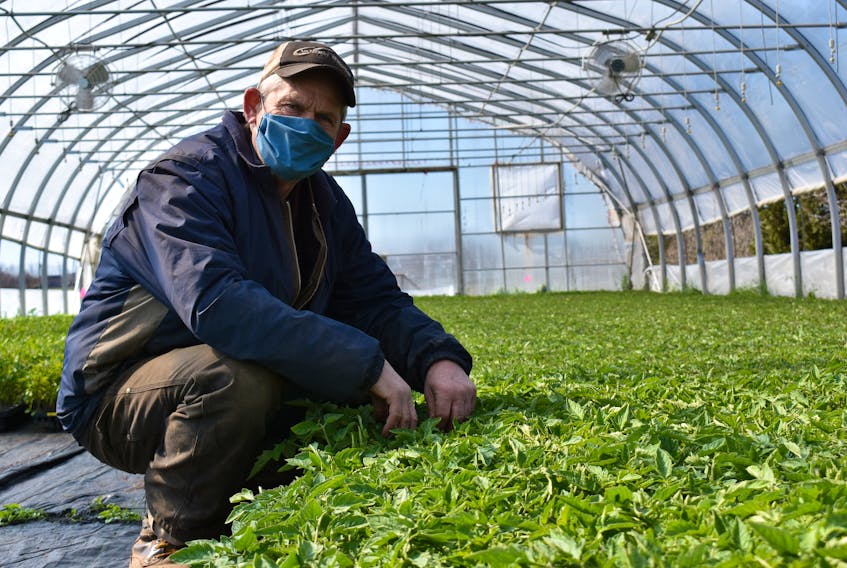Kent Thompson had his staff planting pumpkins, squash and strawberries on Tuesday even though he didn't know if he'd have the labour available to harvest them when the time comes.
The Oxford Berry Farm usually hires 18 Mexican labourers.
Due to COVID-19, Thompson has only been able to get four workers this year and doesn't know if he'll have more by the labour-intensive harvest season.
“I have no one coming to me, looking for a job,” said Thompson.
“We put ads in the paper as part of the documentation required to hire temporary foreign workers. We've had very little uptake. We have people who want to drive tractors or work in our small market but we don't find anyone who wants to be on their hands and knees, working and planting.”
Food production shortfall
In a year when there's never been more Nova Scotians out of work, we're facing a food production shortfall because farmers can't find enough people willing or able to work their fields.
The federal government is in the process of borrowing $42.59 billion to pay 8.33 million Canadians to stay home via the Canada Emergency Response Benefit.
Through its sister program, the Canada Emergency Student Benefit, it has borrowed $652.6 million to pay 478,399 post-secondary students to stay home during the pandemic.
Meanwhile, the people we pay to come from poorer countries to work our fields are largely blocked due to delays caused by the COVID-19 pandemic.

Normally, Nova Scotia farms would have brought in 1,600 temporary foreign workers by this time of year. Right now there are about 500 and farmers don't know if they'll get more when the crunch really hits during harvest time.
“It takes roughly two untrained people to replace one skilled (temporary foreign worker), so you're looking at a labour shortage of more like the 2,000 to 2,250 range if the borders were shut off today,” said Allan Melvin, chair of the Nova Scotia Federation of Agriculture's labour committee.
“... There is an opportunity for individuals to work. The CERB and the student benefit don't help to promote filling that gap.”
So does it say something about who we have become that we will borrow money our children will have to pay back to pay ourselves and our children to not grow the food we hope to eat in a couple months?
“I don't blame anybody,” said Thompson.
“It is what it is.”
What it is, is hard work that requires skill and dexterity to be efficient.
During the early days of the Oxford Berry Farm, Thompson tried hiring all Nova Scotians.
“Thirty to 40 people would say they would come,” said Thompson.
“The first day you might get 20 people. After the first half-day, half of them would be gone. You'd end up with two to three people.”
Job board
The Nova Scotia Federation of Agriculture has set up a job board to connect Nova Scotians willing to work on farms with employers. They've had 150 send them resumes.
“We put them in contact with farmers in their areas, but I don't know how many of those worked out,” said Melvin.
Now 33, Melvin estimates that when he was a child the labour force on what was then his parents' farm near Canning was half Nova Scotian, half temporary foreign worker.
Now in a typical season Melvin Farms Ltd., outside Canning, brings in 40 temporary foreign workers, who tend their cauliflower, spinach, green onions, leeks and cabbage by hand while a couple of locals work as equipment operators.
This year they're altering production to grow fewer labour-intensive crops.
Meanwhile, nearby Vermeulen Farms Ltd. has culled 26,000 tomato plants because the temporary foreign workers weren't available to plant them.
Federation of Agriculture president Victor Oulton has warned in this paper that the labour shortage will result in less food being produced into the summer and fall.
The federal government announced $9.6 million last week for a program that will pay 50 per cent of an agriculture employer's costs to hire a youth (aged 15-30).
It is providing $50 million to the farming, fishing and food processing industries to offset their costs to put temporary foreign workers into a 14-day quarantine after their arrival.
Ottawa is also allowing people to earn an extra $1,000 on top of their $2,000 monthly CERB benefit.
“Before the pandemic, the food sector already faced significant labour shortages. Each year, despite the fact that the agricultural sector receives approximately 60,000 foreign workers, around 15,000 jobs remain vacant,” reads a written statement from federal Agriculture Minister Marieclaude Bibeau.
“To help match Canadians with jobs in the agri-food sector, we launched our ‘Step up to the Plate — Help Feed Canadians' job portal. We also made temporary changes to the Canada Summer Jobs program to help small businesses, like farms and food processors, hire and keep the workers they need so they continue to deliver essential services.”
Conservative leadership candidate Peter Mackay argued that Canadians should be allowed to collect full Employment Insurance or CERB benefits while making as much as they can working on a farm this year.
“Ensuring our food supply is protected during a pandemic must be a top priority,” said Mackay in a written statement.
“... This could provide an incentive to those who are out of work to help fill some work shortages in primary industries this season. We also have to ensure that farmers and fishers have the resources they need to sustain their operations through this pandemic and into the future."









